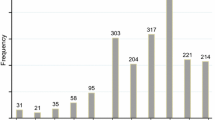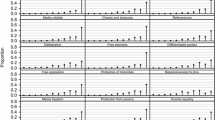Abstract
Of the numerous standards by which we can judge the performance of nation-states, there is perhaps no more important than the quality of citizenship. Characteristics such as stability, effectiveness, and distributional equality are vital indicators of systemic performance, and measures of health, housing, and education are key indicators of the individual quality of life, but only citizenship captures and unites both types of phenomena.
An earlier version of this article was originally prepared at the request of Hans-Dieter Klingemann for presentation at a small workshop on “Criteria for a Democratic Process” at the Wissenschaftszentrum Berlin für Sozialforschung (WZB), April 20–23, 1996. The workshop itself, arranged by Hans-Dieter and Dieter Fuchs, was Klingemann at his best: a small group of highly committed (and highly compatible) researchers freely probing -and occasionally hotly contesting — core issues of democratic governance. For if there is a common core in everything Klingemann has contributed to the social sciences, it is a concern with the basic values, procedures and practice of democracy. His trademark is in this respect highly similar to that of my mentor and colleague, Stein Rokkan, Norway’s foremost contribution to post-war studies of democracy and the conditions for democracy in Europe. The work of Hans-Dieter Klingemann and his numerous student-colleagues in this area can be viewed as both complementary and constructive vis à vis Rokkan’s contribution: complementary, in that Klingemann delves much deeper, both conceptually and empirically, into the actual substance of democratic values, procedures and institutions — how they “work” in practice; and constructive insofar as Klingemann has both explored a broader range of vital “marginal” democratic issues, particularly political protest, direct action and non-democratic values, and updated the perspective to the modern and post-modern challenges of the emerging European Union. As the present paper was first encouraged by Hans-Dieter, and subsequently (for numerous reasons) never published, I feel it is particularly relevant for a festschrift of works reflecting his very strong international influence on a generation of social scientists who have found his exceptional combination of cutting-edge empiricism and traditional concern with the basic values and challenges of democratic governance to be a unique source of critical dialogue in the very best sense of the term.
Access this chapter
Tax calculation will be finalised at checkout
Purchases are for personal use only
Preview
Unable to display preview. Download preview PDF.
Similar content being viewed by others
References
Abramson, Paul R. (1983): Political Attitudes in America: Formation and Change. San Francisco: W. H. Freeman.
Almond, Gabriel A. and Sidney Verba (1963): The Civic Culture: Political Attitudes and Democracy in Five Nations. Boston: Little Brown.
Barnes, Samuel H., Max Kaase, Klaus R. Allerbeck, Barbara G. Farah, Felix Heunks, Ronald Inglehart, M. Kent Jennings, Hans-Dieter Klingemann, Alan Marsh and Leopold Rosenmayr (1979): Political Action: Mass Participation in Five Western Democracies. Beverly Hills: Sage.
Berelson, Bernhard R. (1952): Democratic Theory and Public Opinion. In: Public Opinion Quarterly, 16, pp. 313–330.
Cohen, Carl (1971): Democracy. New York: The Free Press.
Connolly, William E. (1974): The Terms of Political Discourse. Princeton: Princeton University Press.
Converse, Philip E. (1964): The Nature of Belief Systems in Mass Publics. In: David Apter (ed.): Ideology and Discontent. Glencoe, Ill.: Free Press, pp. 206–261.
Dahl, Robert A. (1956): A Preface to Democratic Theory. Chicago: University of Chicago Press.
Dahl, Robert A. (1961): Who Governs? Democracy and Power in an American City. New Haven: Yale University Press.
Dahl, Robert A. (1970): After the Revolution? New Haven: Yale University Press.
Dahl, Robert A. (1971): Polyarchy: Participation and Opposition. New Haven: Yale University Press.
Dahl, Robert A. (1979): Procedural Democracy. In: Peter Laslett and James Fishkin (eds.): Philosophy, Politics and Society. New Haven: Yale University Press, 5th series, pp. 97–133.
Dahl, Robert A. (1989): Democracy and Its Critics. New Haven: Yale University Press.
Dahl, Robert A. and Charles E. Lindblom (1953): Politics, Economics and Welfare. Chicago: University of Chicago Press.
Elster, Jon (1983): Offentlighet og deltakelse (The Public Sphere and Participation). In: Trond Bergh (ed.): Deltakerdemokratiet. Oslo: Universitetsforlaget.
Hagtvet, Bernt (1984): Det ufullendt demokrati: Bernt Hagtvet i samtale med Robert A. Dahl. In: Samtiden, 93, pp. 71–80.
Hagtvet, Bernt and William M. Lafferty (eds.) (1984): Demokrati og demokratisering. Ut-givelsesar.
Held, David (1996): Models of Democracy. London: Polity Press.
Hirschman, Albert O. (1970): Exit, Voice, and Loyalty: Responses to Decline in Firms, Organizations, and States. Cambridge: Harvard University Press.
Jänicke, Martin (1996): Democracy as a Condition for Environmental Policy Success: The Importance of Non-institutional Factors. In: William M. Lafferty and James Meadowcroft (eds.): Democracy and the Environment. Cheltenham: Edward Elgar, pp. 71–85.
Jänicke, Martin and Helmut Weidner (eds.) (1997): National Environmental Policies: A Comparative Study of Capacity-building. (In collaboration with H. Jörgens). Berlin: Springer.
Kariel, Henry S. (ed.) (1970): Frontiers of Democratic Theory. New York: Random House.
Kelso, W. A. (1978): American Democratic Theory: Pluralism and Its Critics. Westport, Conn.: Greenwood Press.
Lafferty, William M. (1983): Political Participation in the Social-democratic State: A Normative-empirical Framework for the Analysis of Decision-making Involvement in Norway. In: Scandinavian Political Studies, 6 (new series), pp. 281–308.
Lafferty, William M. (2000): Democratic Parameters for Regional Sustainable Development: The Need for a New Demos with a New Rationality, Working Paper 1/2000, Oslo: Program for Research and Documentation for a Sustainable Society.
Lafferty, William M. and James Meadowcraft (eds.) (1996): Implementing Sustainable Development. Oxford: Oxford University Press.
Lewin, Leif (1970): Folket og eliterna. Stockholm: Almqvist og Wiksell.
Lively, Jack (1975): Democracy. Oxford: Basil Blackwell.
Marcus, George E. and Russell L. Hanson (1993): Reconsidering the Democratic Public. University Park, Pa.: Pennsylvania State University Press.
Milbrath, Lester W. and M. L. Goel (1977): Political Participation: How and Why Do People Get Involved in Politics? Chicago: Rand McNally.
Muhll, George von der (1977): Robert A. Dahl and the Study of Contemporary Democracy: A Review Essay. In: American Political Science Review, 71, pp. 1070–1096.
Naess, Arne, Jens A. Christophersen and Kjell Kvalo (1956): Democracy, Ideology and Objectivity. Oslo: Oslo University Press.
Newton, Ken (1969): A Critique of the Pluralist Model. In: Acta Sociologica, 12, pp. 209–223.
Nie, Norman H., Bingham G. Powell and Kenneth Prewitt (1969): Social Structure and Political Participation. In: American Political Science Review, 63, pp. 361–378.
Niemi, Richard G. and Herbert F. Weisberg (eds.) (1976): Controversies in Voting Behavior. Washington: CQ Press.
Page, Benjamin I. (1978): Choices and Echoes in Presidential Elections; Rational Man and Electoral Democracy. Chicago: University of Chicago Press.
Page, Benjamin I. and Robert Y. Shapiro (1992): The Rational Public: Fifty Years of Opinion Trends. Chicago: University of Chicago Press.
Parry, Geraint (ed.) (1972): Participation in Politics. Manchester: Manchester University Press.
Pateman, Carole (1970): Participation and Democratic Theory. Cambridge: Cambridge University Press.
Pierce, John C, Kathleen M. Beatty and Paul R. Hagner (1982): The Dynamics of American Public Opinion: Patterns and Processes. Glenview, Ill.: Scott, Foresman and Co.
Ricci, David M. (1971): Community Power and Democratic Theory. New York: Random House.
Rokkan, Stein (1970): The Growth and Structuring of Mass Politics in Western Europe: Reflections of Possible Models of Explanation. In: Scandinavian Political Studies, 5 (old series), pp. 65–83.
Sartori, Giovanni (1962): Democratic Theory. Detroit: Wayne State University Press.
Schumpeter, Joseph A. (1943): Capitalism, Socialism, and Democracy. London: Allen & Unwin.
Thompson, Dennis F. (1970): The Democratic Citizen: Social Science and Democratic Theory in the Twentieth Century. Cambridge: Cambridge University Press.
Verba, Sidney and Norman H. Nie (1972): Participation in America: Political Democracy and Social Equality. New York: Harper & Row.
Verba, Sidney, Norman H. Nie and Jaeon Kim (1978): Participation and Political Equality: A Seven-Nation Comparison. Cambridge: Cambridge University Press.
Editor information
Rights and permissions
Copyright information
© 2002 Springer Fachmedien Wiesbaden
About this chapter
Cite this chapter
Lafferty, W.M. (2002). Varieties of Democratic Experience: Normative Criteria for Cross-national Assessments of Citizenship. In: Fuchs, D., Roller, E., Weßels, B. (eds) Bürger und Demokratie in Ost und West. VS Verlag für Sozialwissenschaften, Wiesbaden. https://doi.org/10.1007/978-3-322-89596-7_3
Download citation
DOI: https://doi.org/10.1007/978-3-322-89596-7_3
Publisher Name: VS Verlag für Sozialwissenschaften, Wiesbaden
Print ISBN: 978-3-531-13641-7
Online ISBN: 978-3-322-89596-7
eBook Packages: Springer Book Archive




